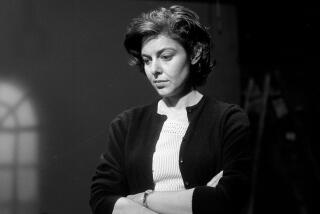BOOK REVIEW : Full-Bodied Tales of Wartime in the West
DRINKING DRY CLOUDS
Stories From Wyoming
by Gretel Ehrlich
Capra Press
$9.95, 160 pages
In her much-praised book of essays, “The Solace of Open Spaces,” and “Heart Mountain,” the novel that followed, Gretel Ehrlich revealed herself to be a writer with a singular understanding of the American West. She doesn’t romanticize the West so much as reveal its pockets of sorrow, its raw and blemished beauty, and the dignity of its denizens.
In her new collection of stories, “Drinking Dry Clouds,” Ehrlich returns to the setting and characters that inspired her 1990 novel, “Heart Mountain,” the name of a World War II Japanese-American internment camp in a remote area of Wyoming. Once again, we alternate between the world of the cowboys and ranchers, and the Japanese-Americans who found themselves jailed in their midst.
After their initial appearance in her life five years ago, these characters “seemed to want to continue to report” to her, she states in a foreword to “Drinking Dry Clouds.” So Ehrlich welcomed these ghosts, letting them speak again in their distinctive voices.
The result is 12 slim and interconnected tales--in some cases sketches rather than full-bodied stories--that take place during, and just after, World War II. All occur in Wyoming save two, which happen on a ship and a train.
The first stories introduce us to the main characters, McKay, a brooding young rancher; Bobby, his Japanese cook, and Pinky, a likable old ranch hand given to bingeing.
Madeleine, McKay’s ranching neighbor and sometimes lover, appears too, as does Carol Lyman, a waitress at the Shipping Yard Cafe, the mother of a pear-shaped retarded son. She spends her days off at Snuff’s Place, a bar “located at a bend in a road that came from nothing and led to nothing for a hundred miles.” It’s these women, Madeleine and Carol, who carry the men in other stories past the turmoil of their lonely lives, who have the strength to run ranches and tend to home fires in the absence of brothers and husbands who have gone off to war.
We also hear the voices of Japanese-American internees--Kai, a young Japanese student, who helps his elderly parents close up their small business in California in preparation for the move to the harsh and bitter new life awaiting them at Heart Mountain. “Bring clothes suited to pioneer life,” Kai and his parents are told, as if they were headed for a a dude ranch.
“Can you imagine how I feel?” Kai writes to a friend during the train ride carrying him to Wyoming. “A little while ago a wave of loneliness came over me like nothing I’ve felt before. . . . I don’t know where we are. They could be taking us to hell, for all I know.”
Hell it might be, but it’s a hell with a human face. “The dark side to the grandeur of these spaces,” Ehrlich wrote in an earlier essay, “is the small-mindedness that seals people in. Men become hermits; women go mad.” There’s a good measure of that in these stories where loneliness takes on a “metallic glare,” exacerbated by the distant war, the feeling half the community is gone, and the other half is waiting and lonely.
In the richest story in the collection, “Thursday at Snuff’s,” the sense of ennui and isolation reaches a peak during an intense storm when Madeleine, Snuff the bartender, and a Japanese internee who has wandered away from the camp, wait out the thunder (is it thunder or planes?), telling each other their stories. Life has left them aching--for women, for home, for a child lost before it was born. In this passage, we are reminded of the healing effects of stories, how they make us forget woes, even temporarily.
The latter stories, such as “Madeleine’s Day” and “Champ’s Roan Colt,” poignantly deal with war’s aftermath. McKay’s brothers, Ted and Champ, return wounded and frightened, no longer able to patiently work with a recalcitrant colt or face a night alone.
Ehrlich understands how war doesn’t establish manhood, as the old war movies would have us believe, but rather often drains men of their strength, leaving them with damaged souls and minds. Madeleine, who has been rehearsing the homecoming of her husband, Henry, taken prisoner of war by the Japanese, finds that he has become “a living skeleton.” Upon his return they cannot “get close,” nor begin to undo the damage.
These stories are told in quiet, understated voices that evoke deeply tumultuous times. They are brief, “small enough to hold in the palm of your hand,” as Ehrlich herself observes. But she is such a deeply gifted writer, her vision so clear, her language so perfect, that they perform the feat of flying, soaring high on their own beauty. These may be slight stories, but they’re Gretel Ehrlich’s and that makes them worth reading. Read them in conjunction with “The Solace of Open Spaces,” and give yourself the old-fashioned pleasure of a double treat.
Next: Carolyn See reviews: “Margret Howth” by Rebecca Harding Davis (The Feminist Press) .
More to Read
Sign up for our Book Club newsletter
Get the latest news, events and more from the Los Angeles Times Book Club, and help us get L.A. reading and talking.
You may occasionally receive promotional content from the Los Angeles Times.






